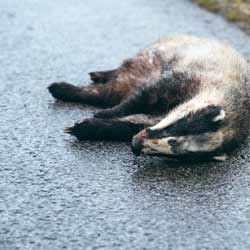Roadkill Collector Jobs
It’s never a pleasant sight, but unfortunately it’s a common one…dead animals on the side of the road. Roadkill. There are endless miles of pavement that animals must cross everyday. It is always a tragedy when a helpless creature is hit by a motor vehicle, but it’s often unavoidable. Luckily, roadkill goes away, thanks to diligent roadkill collectors.
Roadkill collectors locate, remove, and dispose of roadkill. Roadkill is a term used for any creature that is killed by a motor vehicle. The list of potential roadkill victims is huge – wolves, bears, elk, moose, turtles, cougars, kangaroo, squirrels, cats, chipmunks, rats, possums, mountain goats, camels, raccoons, lizards, dogs, even insects and birds.

One commonly hit creature is deer. There are 1.5 million deer collisions per year on average.
Hitting an animal with a vehicle can be very dangerous. When an animal enters the roadway, the first reaction of a driver is to swerve to avoid it. If the driver hits a larger animal, there is potential for damage to the vehicle and injury to the car’s passengers. If the animal is hit and the vehicle leaves the scene, a carcass is a hazard for other drivers. Finally a rotting animal carcass presents health issues that no one wants to deal with.
The first step in preventing roadkill is to give animals a brake – slow down! There are signs along roadways that warn of animal crossings. Every driver should watch for glowing eyes near dusk and dawn. Defensive driving helps prevent roadkills, but an unpredictable deer dashing in front of a Toyota on I-85 can’t be avoided.
Roadkill laws are different in every state. If you have a collision don’t just bolt. All roadkill should be reported immediately. The State Patrol can move the carcass from the middle of the road or at least mark the spot of a sizable creature to warn drivers of a big object on the highway. At this point the roadkill collector’s job begins.
Roadkill collectors spend their days driving around looking for roadkill. They may cover a county, a section of highway, or a large region of roads. When a roadkill is located, the roadkill collector must deal with both the body and with oncoming traffic – a dangerous feat. It’s gruesome and no words can describe the horrid stench of fresh, decaying, or maggot and blood covered carcasses. There is no time for sympathy.
Next comes the daunting task of removing the creature. Roadkill collectors must always wear protective clothing. It may be easy to move a deer or a coyote, but how do you lift a giant moose or massive bear out of the road? Most roadkill operators use rope systems and lift gates to place carcasses in the bed of their truck. Ultimately the bodies are transported to landfills, composting facilities, or in some cases soup kitchens.
Working as a roadkill collector is not a job for animal lovers. It’s a job that is on call 24 hours per day, 365 days per year. One CNN.com article wrote of a roadkill collector in Pennsylvania who is paid $40 per deer and averages 1,800 deer per year. That’s a salary of $72,000 per year. While some are paid per animal removal, others are paid around $15 per hour. Typically a roadkill collector works for the state government, the department of transportation, or private contractors.
At the end of the day, a roadkill collector keeps the roads of the world running smoothly, stops the spread of smells and diseases, and collects a decent paycheck. No doubt about it, cleaning up roadkill is not the job for everyone. But accidents happen and for those who pursue a career as a roadkill collector, there will always be work available.
Quick Facts About Professional Roadkill Collection
Job Title: Roadkill cleaner, Roadkill Collector
Office: The side of the road
Description: Locate, remove, and dispose of roadkill
Certifications/Education: No formal education or skill required
Necessary Skills: Driver license, Able to move large dead animals
Potential Employers: State government, Department of Transportation, private contracts
Pay: $15 per hour or a set rate per animal removal
Helpful Professional Roadkill Collector Employment Links:
Search Roadkill Collector Jobs on JobMonkey
Wildlife Roadkill Identification Guide
Jackson Hole Wildlife Foundation


 Teach English in Asia
Teach English in Asia  Cruise Ship Jobs
Cruise Ship Jobs  Alaska Fishing Industry Jobs
Alaska Fishing Industry Jobs  Sharing Economy / Gig Economy
Sharing Economy / Gig Economy